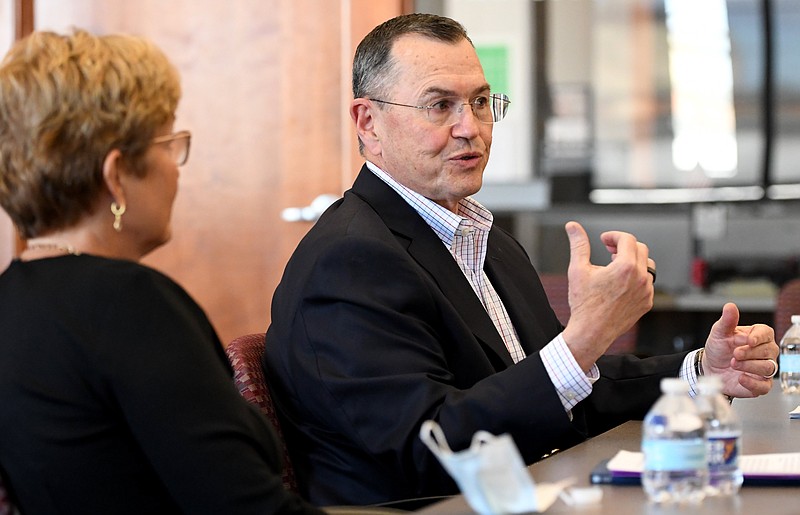The next step toward transitioning Erlanger Health System from a governmental entity to an independent nonprofit organization lies with Hamilton County's legislative delegation, and the group is still mulling over the proposal more than six weeks after it surfaced.
"The delegation just wants to make sure we do our due diligence and have a full understanding of the ask as well as any potential ramifications before legislation is filed," Rep. Patsy Hazlewood, R-Signal Mountain, chair of the local delegation, said in a statement to the Times Free Press.
On March 2, the Hamilton County Commission passed a resolution requesting that the delegation propose an amendment to the 1976 private act that created the Chattanooga-Hamilton County Hospital Authority - better known as Erlanger Health System.
The resolution asks for an amendment that would allow the county to evaluate whether the continued operation of Erlanger as a hospital authority - which is a public entity governed by a politically-appointed board of trustees - is "an effective or beneficial governmental function."
Both Hamilton County and Erlanger's board of trustees have hired legal teams with experience in similar hospital restructuring efforts to guide them through the evaluation.
If the county determines that Erlanger's structure is no longer beneficial, the resolution requests permission to dissolve the authority so that Erlanger would be "owned and/or operated by a nongovernmental entity to promote the provision of high-quality health care services for years to come."
The county commission would have to approve the change by a two-thirds vote, according to the resolution.
Though the current General Assembly will likely wrap up in a few weeks, Hazlewood said any legislation needed to set up such an entity would be a private act, which can be acted upon quickly once introduced because those bills don't go through the regular committee process.
"The delegation continues to have dialogue with representatives of both Hamilton County and the Erlanger board regarding the concepts for a 501(c)(3) [independent nonprofit] structure and the specifics of the proposed legislation that would enable its establishment," Hazlewood said.
County Mayor Jim Coppinger and Erlanger board chair Jim Coleman have both said they believe an independent, private nonprofit model would better position Erlanger to compete in the modern health care era.
One factor repeatedly cited is a desire to operate in private. As a governmental entity, Erlanger is subject to open records and transparency requirements that Erlanger officials say put them at a disadvantage against private competitors.
"The health care industry has changed significantly since the [authority] was formed in 1976, and [Erlanger] has evolved to address many of these changes," the resolution states. "But successful operation in the health care industry going forward may require more flexibility than a government entity such as the [authority] can provide."
In February, Hamilton County and Erlanger officials announced they had been working for nine months in private on plans to restructure the health system as an independent nonprofit in an effort to level the playing field with the system's private competitors.
In the 130 years since it was founded, Erlanger has grown to become one of the nation's largest public hospital systems, comprising six hospitals across Southeast Tennessee, including the only children's hospital within 100 miles, a hospital in Murphy, North Carolina, and an academic teaching program affiliated with the University of Tennessee College of Medicine.
Erlanger brings in more than $1 billion net revenue annually and employed just more than 6,300 full- and part-time workers as of June 30, making it Hamilton County's largest employer.
It's also home to the region's only Level 1 trauma center, which treats the most severe injuries, and the Southeast Regional Stroke Center, which provides the highest level of stroke care and is one of the nation's busiest stroke centers.
On top of those costly specialty services, the health system is the largest area provider for low-income and uninsured patients. Last year, Erlanger provided around $150 million worth of uncompensated care - a figure that has grown 36% in four years.
Contact Elizabeth Fite at efite@timesfreepress.com or 423-757-6673. Follow her on Twitter @ecfite.
